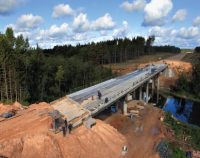Roller-Compacted Concrete : 5 PDH
$30.00
SPECIFIC KNOWLEDGE OR SKILL OBTAINED
This course teaches the following specific knowledge and skills:
- Define roller-compacted concrete and distinguish it from conventional concrete and embankment materials in terms of composition and application
- Evaluate the suitability of materials, including aggregates, cementitious substances, and admixtures, for RCC construction
- Design RCC mixture proportions to meet structural and performance criteria based on strength, durability, and workability requirements
- Apply best practices for RCC placement, compaction, and construction using specialized equipment and techniques
- Implement quality assurance and quality control procedures throughout the RCC construction process
- Analyze the performance of RCC structures post-construction with respect to watertightness, durability, and structural integrity
CERTIFICATE OF COMPLETION
You will be able to immediately print a certificate of completion after passing a 20 question multiple-choice quiz. The quiz can be retaken unlimited times until a passing grade of 70% or better is earned. This course satisfies five (5) hours of professional development (PDH).
Related Courses
Approach Roadway Deformations: 4 PDH
$24.00 Add to cartIn this course the student will understand roadway approach embankment design and construction and methods to mitigate deformations typically seen in these structure, including the infamous “bump” encountered at the approach to structure interface.Instructor: Raymond Bosek, PESPECIFIC KNOWLEDGE OR SKILL OBTAINED
This course teaches the following specific knowledge and skills:
- Explain typical approach roadway deformation problems
- Discuss internal and external deformation
- Understand computation of immediate and consolidation settlements
- Explain deformation design solutions
- Understand construction monitoring and quality assurance
CERTIFICATE OF COMPLETION
You will be able to immediately print a certificate of completion after passing a 20 question multiple-choice quiz. The quiz can be retaken unlimited times until a passing grade of 70% or better is earned. This course satisfies four (4) hours of professional development (PDH).
Preview CourseClick “Preview Course” to view prior to purchaseClick “Add to Cart” to purchaseLightning Protection Design and Standards: 5 PDH
$30.00 Add to cartIn this course the student will understand the principles, standards, risks, and design methods of lightning protection systems, including external and internal protection strategies, materials selection, and risk assessment based on IEC 62305 standards.Instructor: Juan Pesante, PESPECIFIC KNOWLEDGE OR SKILL OBTAINED
This course teaches the following specific knowledge and skills:
- Explain lightning physics and flash mechanics.
- Apply IEC 62305 lightning protection standards.
- Design air-termination and grounding systems.
- Evaluate lightning risks using risk management frameworks.
- Select appropriate materials for lightning protection systems.
- Integrate surge protection devices into power systems.
CERTIFICATE OF COMPLETION
You will be able to immediately print a certificate of completion after passing a 20 question multiple-choice quiz. The quiz can be retaken unlimited times until a passing grade of 70% or better is earned. This course satisfies five (5) hours of professional development (PDH).
Preview CourseClick “Preview Course” to view prior to purchaseClick “Add to Cart” to purchase




